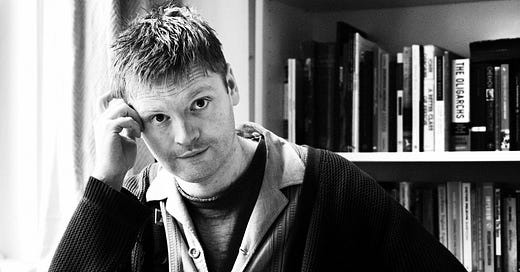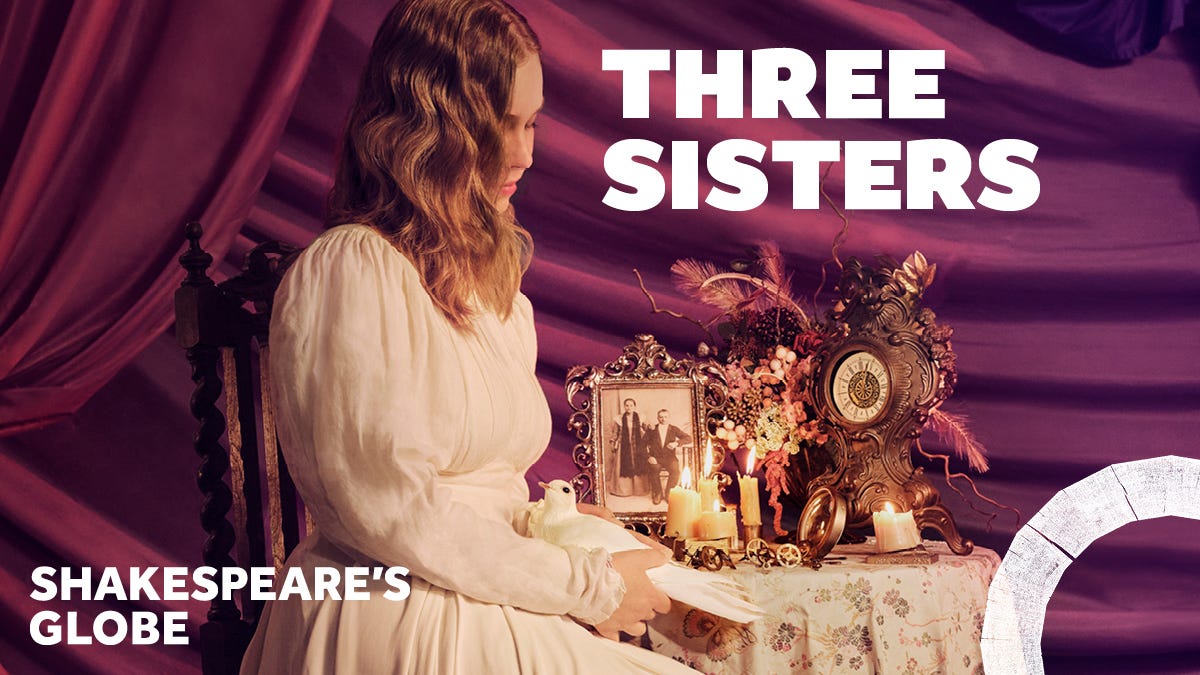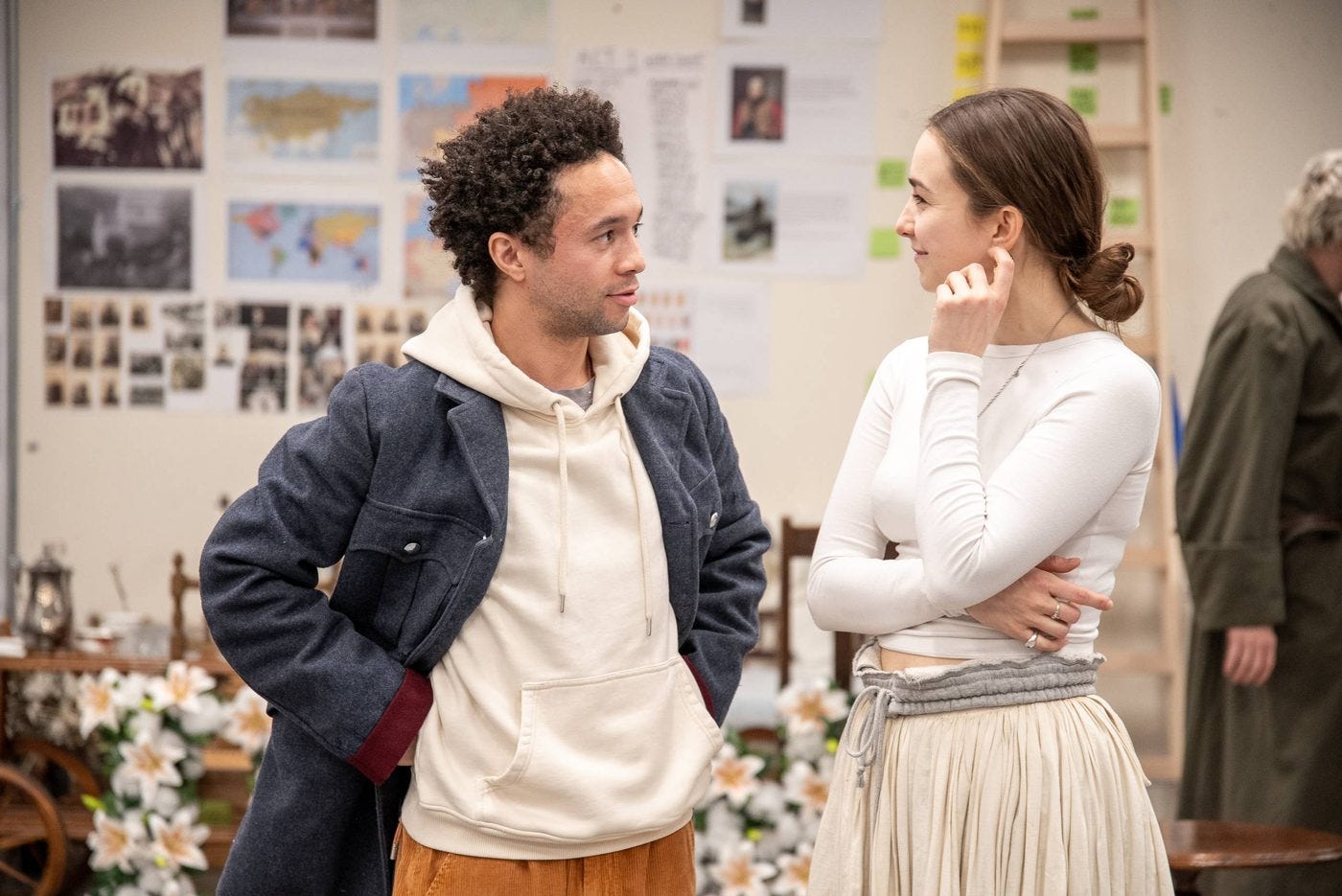'Meaning is always unstable': Rory Mullarkey on the mystery of Chekhov
As Three Sisters opens at the Globe, the playwright explores how translating Russian and Ukrainian has defined his career - and his life
By Rory Mullarkey
The more Chekhov learned, the less he knew. There’s a truism about the great Russian writer – that his other career as a practising doctor gave him a kind of forensic understanding of human beings and how they work. But I think it’s the opposite. I think, if all his years seeing thirty or forty patients a day in his consulting room, if all his months interviewing thousands of inhabitants of the Far-Eastern island of Sakhalin for the census taught him anything, it’s how endlessly surprising, confounding, bewildering, shifting, insoluble, ridiculous, miraculous, human personality can be. His work is all humility before the sacred mystery of being alive. And the humility of his vision finds its ultimate theatrical expression in his strange, beautiful Three Sisters.
Translation, too, like any art, makes its home in the unknowable. I studied Russian, I’ve travelled widely in Russia and in the former Soviet Union, and I’ve translated plays from Russian and Ukrainian. Being a translator has defined more than my career – it’s defined my entire life.
My mother is a German translator, and I’d always been interested in languages; I was lucky to go to quite a posh school, that offered Russian as a GCSE subject. I was getting badly bullied at the time, and was told by the teachers that I was bringing it on myself by, and I quote, “sticking my head above the parapet”. Then, when I went to talk to the Russian teacher about why I should study Russian, he said “I think Russian is for people who stick their heads above the parapet”. The linguistic echo felt like fate.
I was an alt teenager in the early 2000s: I liked punk and metal and wearing hoodies with band names on them, and there’s something about the outsider-ish nature of Russian literature that really appealed. I got into Lermontov and Gogol and Chekhov, Dostoevsky, Pushkin. So I went to study Russian and Latin and Ukrainian at university, and then lived in Russia and Kyrgyzstan.
After I came back, I had a play on at the Edinburgh fringe that was read by the director Lyndsey Turner, who was working at the Royal Court in the International Department. She contacted me as a writer – but also as a translator. That was really my gateway into my career, and since then, I’ve translated about 30 or 40 plays from Russian and Ukrainian.
Three Sisters is Chekhov’s most beautiful play. It’s also his most elusive play. The politics of The Cherry Orchard feel so clear; in The Seagull, it’s about art vs life and, as in Uncle Vanya, there’s a main central quartet of character relations. Whereas Three Sisters is much more polyphonic – people passing in and out.
Chekhov is such an extraordinarily humble writer: he allows his characters to have this innate core of mystery and opacity that means that, no matter how many times the plays are done, you can always find new things in them. That’s also true of Shakespeare’s characters: he allows them to be surprising and multilayered. You feel you’re being presented with something human, and mysterious, and hard to completely get your head around. That draws us back, again and again.
When you’re translating, you always have to remind yourself to serve that, and not to try to clarify for the sake of an ease of delivery by an actor, or an ease of comprehension by a director, or an audience. Chekhov has chosen to use that word, that is more strange – so why has he done that? And let’s find the way that that can work in English too.
An example, late in the play: Masha asks Chebutykin “did you love my mother?” and he says “very much”. And most translators have that as “were you in love with my mother?” – which you can understand is a very dramatic question, a brilliant question to ask in a surprising moment, and the temptation is there to use it… But he doesn’t say “in love with” he says “love”, which is much more vague. I have tried to always be honest with what Chekhov is doing, and how many layers and possibilities he’s putting into each of those words. Hopefully that can give that sense of mystery and greatness – whereas pinning it down would lose something of its beauty.
And meaning is always unstable in translation. When an actor or director (themselves kinds of translator), seeking insight into some textual strangeness, asks me “What does it mean in the original?”, I find that question almost impossible to answer. There are so many elements at play in every decision: sense, emphasis, word-order, tone, mood, context, intention. And every choice matters. Every choice is political. Even Google Translate is political. Especially Google Translate.
So where do you even begin? I tend to think about priorities. And my priorities, for my new version for Shakespeare’s Globe, were rhythm and sound. Three Sisters is such a sonic play. Think of the marching band at father’s funeral, the gunshots over his grave, the clock-chimes, the piano, the guitar, the whistling, humming, singing, accordions in the street, alarm bells for the fire, the clock-smashing, the watch-winding, the final far-off gunshot, the marching band moving away. Although Chekhov lovingly draws each individual’s dreams and desires, their imperfect means of expression, their language, is remarkably shared and simple, with frequently used words and phrases leaping between the characters like motifs moving between instruments in a symphony. I’ve tried to amplify those echoes.
Chekhov has his own specific phrasing too – long propulsive sentences trailing off in ellipses, filled with stark monosyllables, like the clean-tumbling waterfalls of notes in the Chopin Nocturnes he loved so much. These sentences that go on forever – which is a very non-naturalistic thing to do – and have this extraordinary flow to them, so that they feel like they are inside the character’s mind.
Irina says – this is one sentence – “I’m nearly 24 years old but I’ve already been working so long that my brain has dried up, I’ve got thin, I’ve got ugly, I’ve got old and there’s nothing, nothing, no kind of satisfaction, and time is running out and it feels like a real beautiful life is moving away from me, moving further and further away, and I’m falling into some kind of abyss.” Full stop. You can see how it’s totally in her mind (as well as being this amazing one-breath thing for an actor to say).
Or take this bit of Masha, from near the end of the play: “On the curved seashore a green oak tree, a golden chain on the oak tree there... A green cat... A green tree...” Messing it up... (Drinks water.) Worthless life... Don’t need anything anymore... I’ll calm down in a minute... Makes no difference... ‘On the curved seashore’ what does it mean? Why are those words stuck in my head? Thoughts are a mess.” Eight ellipses in a single short speech – as Masha disintegrates in the wake of her lover's departure, so does her language, so do her thoughts. Most translators chop down these big sentences into smaller ones or cut these ellipses – they don’t sound very English – but I’ve kept them in, because I want you to hear them too.
Because “sounding English” isn’t the point. It’s a Russian play, set in Russia, one hundred and twenty-five years ago. The words will be spoken in English, by British actors, in this production, but the translation’s job, or my job, as I see it, is to make those two times and places exist for you at once. If anything, “sounding Russian” is the point.
And Russian hasn’t changed anywhere near as much as a spoken language in the last 125 years as English has. The original text in Russian still really sounds like someone talking on the street, in a way that, say, an English translation of Chekhov from the 1970s absolutely doesn’t. The characters say “I’m cold”, “I’m hungry”, “I love this person” – that simplicity is a thing I hope I can translate. And it’s a thing that often gets lost in translations of Chekhov: he’s thought of as a writer of character and subtext, but I really feel that he’s poetic – he’s a language writer, in the same way as Pinter or Beckett or Shakespeare or Kane. The symphonic way he uses these simple words, combined together, is so a much part of the musical effect of what he’s trying to achieve.
There can be this slightly Edwardian, country house idea of what Chekhov is – people gazing out of a window, dreaming. But actually, the way that he writes is so front-footed, it’s so direct and simple and clear. A lot of the time that activity gets lost in translation. But the way that he dramatizes waiting – and makes dramatic the sense that a lot of life is outside of your control – is wonderful, and pretty revolutionary for the time.
I often think of Three Sisters (1901) in tandem with another great play that doesn’t ‘sound English’ – partly because it was written by an Irishman, and partly because it was originally translated from French – Waiting for Godot (1953). Both plays build complex musical patterns from achingly simple words of need and desire. Both plays concern waiting, that absurdly human activity, filled with and devoid of agency, doing something and nothing at the same time. These two masterpieces sit, like bookends of Modernism, with a half-century of horror between them, Chekhov warning of a world where people will be turned into numbers, Beckett confronting it.
Perhaps, several decades ago, there was more sense of authority to the art of translating: that this is the definitive version, it’s got all the words right… But I like the approach we have now, different people putting different takes on these classics – partly because I think these plays are robust enough to be taken in multiple different directions, and partly because seeing translations from lots of different writers from lots of different backgrounds is more interesting than saying ‘this version is the authority and we must listen to this one’.
But I do think that I, as someone who speaks Russian, bring a different flavour to it than someone who is reading the ‘literal’. If a playwright is working from a literal, the play is very much filtered through someone else – they’re reading the translator’s words, not Chekhov’s. They aren’t seeing all the things that are in the original, like the rhythm and the sound; they’re just seeing meaning. They can obviously create a brilliant, wonderful version from that – it’s completely possible to do that – but to claim that it’s an equivalent is not really correct.
So what I am trying to do, specifically, is tell the English audience what I love so much about Chekhov, by going to the rhythm and the sound. It’s a different kind of version, and I think there should be room for all of them.
My translation work has been so important and influential on my playwriting. The two things go hand-in-hand with one another, and completely define how I think about words, and how I think about rhythm and meaning. It gives me a concern and a care about words, and their power. When you’re working through someone else’s text, it’s like being in someone else’s head: it’s an amazing intimate relationship, and it’s also teaching you about writing – it’s like going to the gym.
But obviously, the Russian/Ukrainian situation is different now, and the context of being a Russian translator has changed. It’s a very fraught, complicated thing to think about as somebody who loves that part of the world.
And it has been tough, translating this play in 2025. You sit at your desk and you look at the words, you work through them one by one, keeping your eyes firmly fixed on the page, but the world still seeps in through the cracks. It can’t not.
When the officers leave for Poland in Act Four, they leave for a land very much verging on present-day Ukraine. They leave “in their marching uniforms”, to do the bloody work of Empire. What would Chekhov say, today, to see his young countrymen leaving to do the same thing? He might say, as his strange and wonderful play says too, I think, that we mustn’t ever let people be turned into numbers. He might say that each of them, whoever they are, whether three sisters or thousands of Russian soldiers, thousands of Ukrainian soldiers, millions of Ukrainian civilians, that every single one of them is singular, magnificent, endlessly mysterious, complicated, beautiful, themselves, and, for this magical moment at least, alive. And we must try to remember that. He might say something like that. But I can’t be certain. Because, when Chekhov’s about, nothing is certain.
Compiled for Exeunt from an essay by Rory Mullarkey and an interview by Holly Williams
Three Sisters is at Shakespeare’s Globe, London, to 19 April









